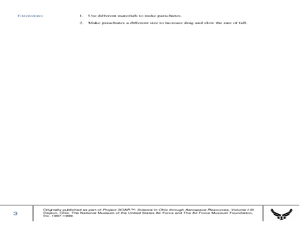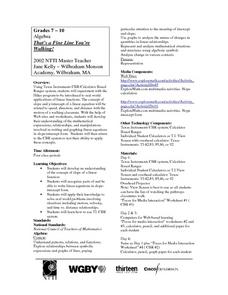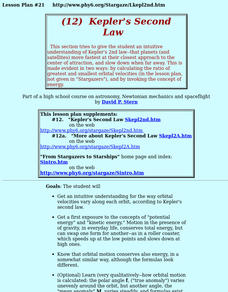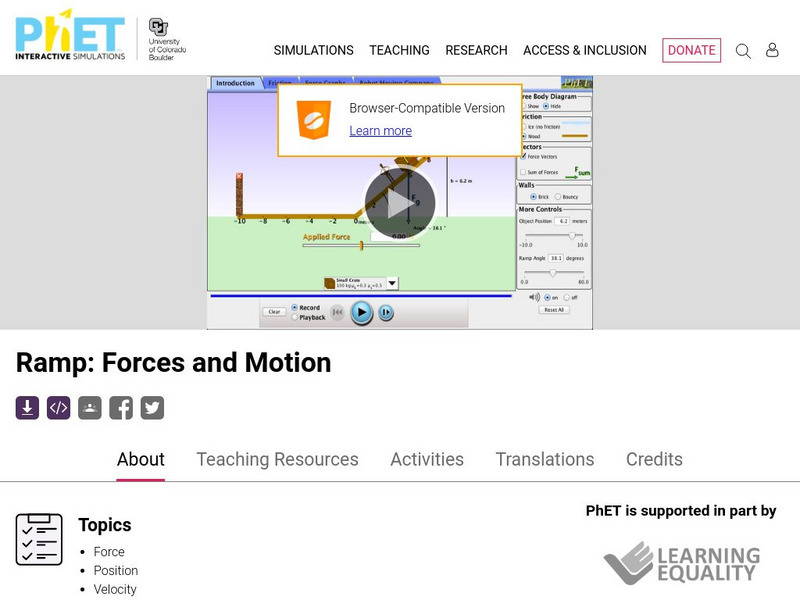Curated OER
Worksheet 21 Spring 1996
In this math worksheet, students consider a path around the unit circle parameterized by σ on the interval [0, 1] with σ(t) = sin(5πt − π), cos(5πt − π). Then they find the vector.
Curated OER
The Mysterious Hexagon on Saturn!
In this Saturn worksheet, students use a photograph of a hexagon feature on Saturn to solve three problems. These include finding the time it takes for the jet stream to complete one circuit around the hexagon, to find the size of the...
Curated OER
That Mu You Do
Students are told that the weight of a car is equal to its mass multiplied by the acceleration due to gravity. When a car is at react on a horizontal road, there must be a normal force with which the road pushes up on the car to keep it...
Curated OER
Does Weight Affect Drag?
Students investigate how weight affects a parachute's rate of fall. In this investigative instructional activity students test parachutes, average results and conclude what makes a faster descent.
Curated OER
Catapults!
Students work together to discover the relationship between the angle of catapults and the flight of different objects. They discover the heavier the object the more force is needed. They examine how engineers use this information to...
Curated OER
That's a Fine Line You're Walking!
Students experiment with Hiker program to practice real world applications of linear functions and develop their understanding of expressions, relationships, and manipulations involved in writing and graphing linear equations in...
Curated OER
Physics and the Quantum Mechanical Model
In this physics worksheet, students review vocabulary terms and key equations associated with the quantum mechanical model. Students apply the quantum theory to explain the photoelectric effect. This worksheet has 5 true or false, 12...
Curated OER
Impulse and Momentum
Students are introduced to the concepts of impulse and momentum and problem solving strategies for these types of problems. In groups, they discover the law of conservation of momentum and share their answers with the class.
Curated OER
Kepler's Second Law
Students gain an understanding of Kepler's 2nd law--that planets (and satellites) move fastest at their closest approach to the center of attraction, and slow down when far away. They explore the concepts of "potential energy" and...
Curated OER
Mathematical Techniques - Basic Graphing
Students are introduced to significant figures and how to add, subtract, multiply and divide them. In a group, they practice plotting data points from a table to a graph and labeling all axes. They calculate the slope and y-intercept and...
Curated OER
#22 Frames of Reference: The Basics
Students explore the concept of frames of reference in physics.
Curated OER
Mechanics Aren't Just for Cars
Third graders are introduced to the correct mechanics of throwing. They work in peer groups to demonstrate proper throwing form and critique each other's performance.
Texas Education Agency
Texas Gateway: Speed, Velocity, and Acceleration
Given descriptions, illustrations, graphs, charts, or equations, students will differentiate between speed, velocity, and acceleration.
Science Education Resource Center at Carleton College
Serc: Investigating Motion Graphing Speed
For this introduction to motion activity, middle schoolers will get a personal understanding of speed and acceleration by experiencing it firsthand. Wheeled office chairs or other cart like devices are used to give one student a ride as...
Khan Academy
Khan Academy: Simple Harmonic Motion: Find Speed, Velocity, Displace From Graphs
Practice finding speed, velocity, and distance traveled for an oscillator from graphs of simple harmonic motion.
Science Education Resource Center at Carleton College
Serc: Investigating Motion: Calculating and Graphing Students Walking Speed
In this activity students will collect and analyze data of their walking speed. They will compare their speed to an outside speed walker. They will determine their speed every 20 meters up to 100 meters. They will complete five trials to...
University of California
Ucla: Speed and Velocity
Discusses the meaning of velocity in terms of a graphical representation. Calculus-based discussion. Good graphics.
Texas Education Agency
Texas Gateway: Introduction to Motion
What do you think of when you hear the word motion? Are you moving right now? You may not think so, but you are. Remember, the Earth is moving around the Sun, and the Sun is moving around the Milky Way Galaxy. Everything in the universe...
Georgia Department of Education
Ga Virtual Learning: Linear Motion
A learning module where students gain an understanding of the relationships between the different kinds of motion. Students will be able to explain free-fall motion and use kinematics equations to calculate problems involving falling...
Science Education Resource Center at Carleton College
Serc: Motion: Speed of Automobiles
In this activity, students will determine the speed of a moving vehicle using a stopwatch and meter stick, then convert the measurement from meters/sec to miles/hr. After completing this activity, students should understand average...
University of Colorado
University of Colorado: Ph Et Interactive Simulations: Ladybug Motion 2 D
Learn about position, velocity, and acceleration vectors by moving the ladybug. Set the position, velocity, or acceleration, and see how the vectors change.
University of Colorado
University of Colorado: Ph Et Interactive Simulations: Ramp: Forces and Motion
Explore forces and motion as you push household objects up and down a ramp. Lower and raise the ramp to see how the angle of inclination affects the parallel forces.
Texas Education Agency
Texas Gateway: Changes in Motion
Given diagrams or scenarios, students will measure and graph changes in motion.
Physics Classroom
The Physics Classroom: Circular and Satellite Motion: Speed and Velocity
In this interactive module, describe and explain the motion of objects that either move in circles or can be approximated to be moving in circles. Kinematic concepts and motion principles will be applied to the motion of objects in...

























